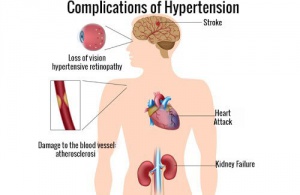The Best Ways to Fight High Blood Pressure

Arterial hypertension, also known as high blood pressure, means that your blood pressure is equal to or higher than 140 mm Hg of systolic pressure, and equal to or higher than 90 mm Hg of diastolic pressure. This condition brings along higher risk of suffering cardiovascular disease, so it’s good to know how to fight high blood pressure.
Heart disease is the number one cause death from illness in the world, so it’s best to treat it as soon as possible. Today, we’re going to give you three key points of advice on how to lower your high blood pressure, and your heart disease risk along with it. We’ll also show you some great foods and simple tips to help. Read on!
Possible causes of high blood pressure
Even though we still haven’t figured out all the potential causes of hypertension, it has been proven that it can be a result of genetic factors and, and that lifestyle plays a huge part. That includes things like:
- Excessive consumption of salt and salty foods
- Obesity
- Stress and emotional burdens
- Sedentary lifestyle
- Excessive consumption of foods with amines (cured cheese, beer, and lunchmeats)
In many cases, especially when only your diastolic pressure is high, it can cause liver failure. If this is your case, you should care for your kidneys. One simple way to do that is to maintain a fruit and vegetable rich diet with healthy levels of vitamin C.
Symptoms
It’s not always easy to fight high blood pressure, though, because it doesn’t always have obvious symptoms. It can be a huge health risk if it goes under the radar like that. But, some common symptoms to watch out for are:
- Headaches
- Dizziness
- Difficulty breathing
- Chest pain
- Buzzing or ringing in the ears
- Nosebleeds
- Blurry vision
- Excessive sweating
If you have any of these symptoms or think that you might have high blood pressure, you can go to the nearest clinic or pharmacy. The people there can help you take your blood pressure. As always, it’s also a good option to go see the doctor as soon as possible if you’re worried about this.
Foods to help you fight high blood pressure
Garlic
Garlic is an excellent therapeutic food for treating all kinds of health problems, by purifying the blood or cleansing the intestines, for example. With high blood pressure, garlic acts as a vasodilator for the blood vessels and arteries.
Many people already know of the benefits of garlic and eat it raw each morning. To make it more easy to get down, you can spread it on toast and add a bit of olive oil. Another option is to try the Tibetan garlic cure.
Read more:
Or, if you’re sensitive to the smell and flavor, you can also purchase garlic oil in capsule form.
Lemon
Lemon definitely deserves a mention. Unlike other citrus fruits, even though it’s acidic, it can also help neutralize stomach acids. Plus, it’s a great, vitamin C rich blood cleanser.
If you have high blood pressure, it can help make your blood vessels softer and more flexible for healthy blood flow. On top of that, lemon contains a lot of vitamin B, which can help prevent heart failure.
Artichoke
Artichoke has diuretic properties that allow it to remove excess liquids from the body, reducing arterial tension. In fact, it’s considered a great natural remedy to fight high blood pressure. In addition, artichokes have a lot of potassium, which also reduces arterial hypertension. Lastly, it can helps your digestion and protect your kidneys.
You might like:
6 Benefits of Artichokes For Your Health
It’s good to make it a regular part of your diet, sautéed or baked. If it’s not in season, you can resort to canned or natural extracts.
Other advice to fight high blood pressure
- Bathe your arms in hot water and dip your feet in lukewarm or cool water
- If you are taking any diuretic medication, it’s good to also take a potassium supplement or to have foods with it (tomatoes, broths, banana smoothies, etc.). This can help prevent increased sensitivity, nerves, etc.
- It’s important to exercise. We recommend that you power walk, run, ride a bicycle, or swim for between 30-45 minutes a day, at least three times a week.
- There are some other supplements that can help: Coenzima Q10, Vitamin B5, Vitamin C, and Vitamin E
- We recommend that you avoid coffee, ginger, tea, mate, licorice root, and tobacco. These can all raise your blood pressure if you have them regularly.
This text is provided for informational purposes only and does not replace consultation with a professional. If in doubt, consult your specialist.








